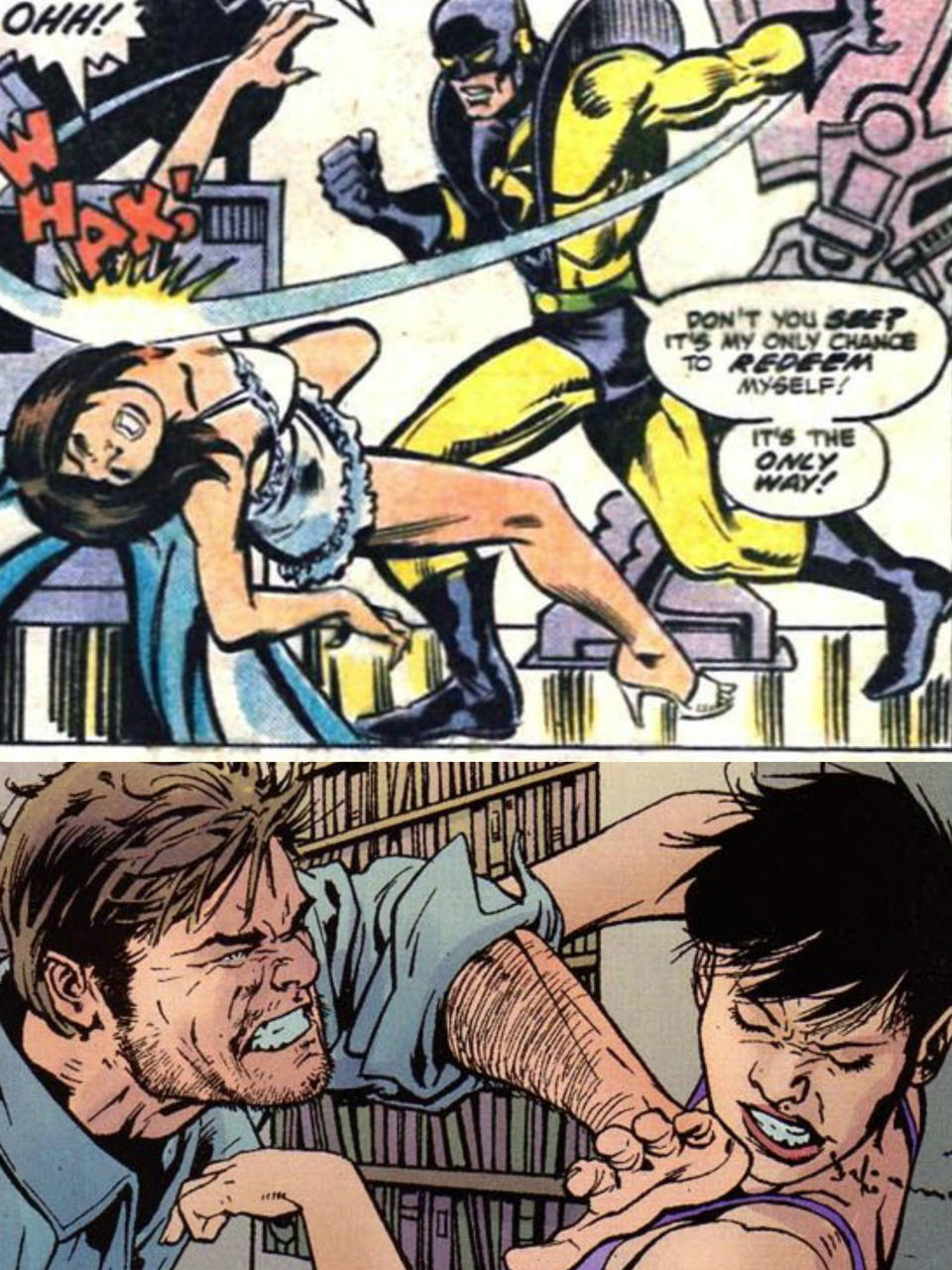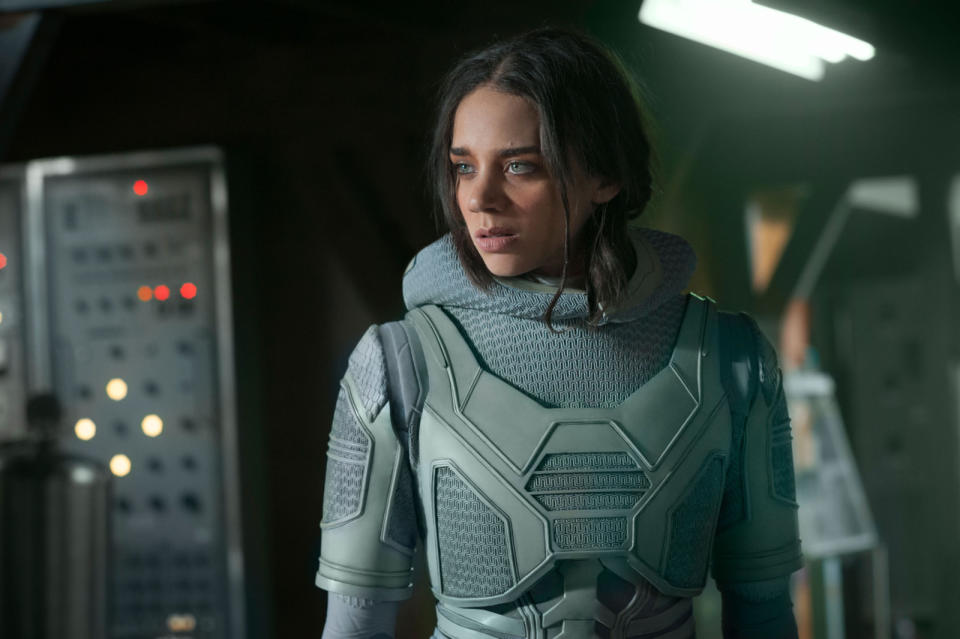Ant-Man and Domestic Violence: Will Marvel ever address the dark side of Hank Pym?
Ant-Man might be one of the funniest additions to the Marvel Cinematic Universe but the hero hasn’t always been associated with so much levity. In fact, the original iteration of Hank Pym has a far darker history on the page than the one presented in the films Ant-Man and Ant-Man and the Wasp, and that history concerns domestic abuse.
It began with a 1981 panel which saw a crazed Hank back-hand his wife Janet van Dyne. This moment solidified to many his position as a wife-beater, despite the incident occurring during a mental breakdown caused by a brain-altering chemical spill, but it is a plot element that has been revisited more than once in the comic books.
In The Ultimates (2002), an alternative universe Avengers series, Hank (Giant Man at the time) becomes jealous of Janet’s success during the takedown of the Hulk, subsequently attacks his wife then tries to murder her with bug spray after he forces her into her Wasp form. Then, in the later comic book run Ant-Man and the Wasp (2010), Hank opens six domestic abuse centres in his late wife’s name, another reference to his tempestuous past.

While the Marvel Comics have never really forgotten about Hank’s history of domestic violence, the Marvel movies have completely avoided it, so Yahoo Movies UK asked the cast and director of the latest Ant-Man film why.
“The issue of the domestic violence that existed in the original comic books was something that was talked about at length before they started the first Ant-Man film,” says Evangeline Lilly, who plays Hank and Janet’s daughter Hope van Dyne in the franchise, and the new Wasp to Paul Rudd’s Ant-Man. In the first film, Hope and Hank (Michael Douglas) have an antagonistic relationship that intensifies over the years because of his lies about the circumstances of Janet’s (Michelle Pfieffer) “death.”
“Hope was estranged from her father, she hated her father and there was a very big question,” Lilly continues. “I posed the question: Is part of that hatred to do with the fact that he was a drunk and he was violent towards her mother?”
That would have been an obvious way to reference the darker elements of Hank’s comic backstory, and show the MCU’s evolution towards showcasing the far more gritty realities explored on the page. Netflix’s Marvel series like Jessica Jones and Luke Cage were delving into far more traumatic narratives concerning their heroes, so why not show that awareness in the films?

“There’s never been an onus on us in the MCU movies to have any real fidelity to specific stuff in the canon,” director Peyton Reed says. “Fans may want certain things but it really never occurred to us from the very beginning to be a part of it, even as far back as Edgar [Wright] and Joe [Cornish]’s original drafts for the first Ant-Man.”
“It wasn’t like taking a cape off Superman and people being in uproar, it was that one storyline. I think that’s the thing in Marvel Comics; all the artists and writers sort of adapt the characters in different decades to sort of do what they wanted to do with it, and that wasn’t the Hank Pym that we wanted to tell.”
Not that they were shy of showing Hank in a less than perfect light. His temper is shown from the very beginning of Ant-Man as well as his often unfriendly nature during his training of Scott Lang. “I did like the idea of creating a screwed-up kind of mentor where he does have anger issues, and he has ego issues, and that’s something we expanded in this movie definitely,” Reed continues, “this schematic that Hank Pym in his past did not always play well with other people and that, maybe, what Janet brought to that partnership was kind of evening that out.”

This is explored further through the introduction of Ghost (Hannah John Kamen) and Bill Foster (Laurence Fishburne) in Ant-Man and the Wasp, as they remind Hank of how his hostile actions may have affected others. To Reed, Ghost is not a villain rather an antagonist who the audience can at times root for more than our heroes, especially considering how her circumstances are tied to Hank.
“Ghost is incredibly powerful, but her powers for her are as much a burden as anything else, they are an affliction, and her whole goal is to find a cure for this and it puts her on a collision course with our heroes,” the director says. “I liked the idea to create an antagonist that the audience truly understood what her dilemma was and they get it. Tying it in with Hank Pym’s past seemed interesting to us.
“Though Hank is not directly responsible for that maybe it calls into question: does his ego sort of create this situation, that sort of creates her?”
The line between good and bad has certainly been explored in the most recent MCU movies; in Avengers: Infinity War, Thanos believes his genocidal decision is for the good of the universe while the antagonism of Erik Killmonger in Black Panther stems from centuries of his people being subordinated by white oppressors.

The latter film has been widely praised for its reflection of the racial conflict that still exists in the world, and veering into the more socially conscious territory of the comic books, but Lilly says that the reason why the Ant-Man films haven’t, and won’t, do the same with regards to domestic violence is because of how these films are being presented.
“The decision was made that they really wanted this to be a family franchise and that was not something they wanted to put on a pedestal, because Hank was the original Ant-Man and is sort of a paramount figure in our films,” she explains.
“We didn’t want to in any way glamorise domestic violence which is, I think, the danger in a surreal world when you can’t bring home the hard hitting truth of the dangers and horror of domestic violence.”
Michael Douglas reiterates this point, saying he doubts this aspect of his character will be touched upon in future movies either. “We seem to be going in a more humorous, comedic, familial sense,” the actor says. “There is more than enough darkness to go around in the Ant-Man world so it may, but I don’t imagine it will happen that way.”
Paul Rudd, however, says that the future of the Ant-Man franchise could lead to a change in direction in the same way that the MCU has already seen the reinvention of several heroes through both the narrative and aesthetic style of their solo franchises.
“[Thor:] Ragnarok seemed different than the other Thor films,” Rudd adds. “I think that depending on a director’s vision, or what they want to do there are always directions you can take it.
“It’s a risk but it’s interesting when it works.”
Ant-Man and the Wasp is in UK cinemas from 3 August
READ MORE
Cavill thinks M:I6 could land him Bond role
Hotel Artemis director paid for props on his credit card
Whatever happened to Tobey Maguire?

 Yahoo Movies
Yahoo Movies 
